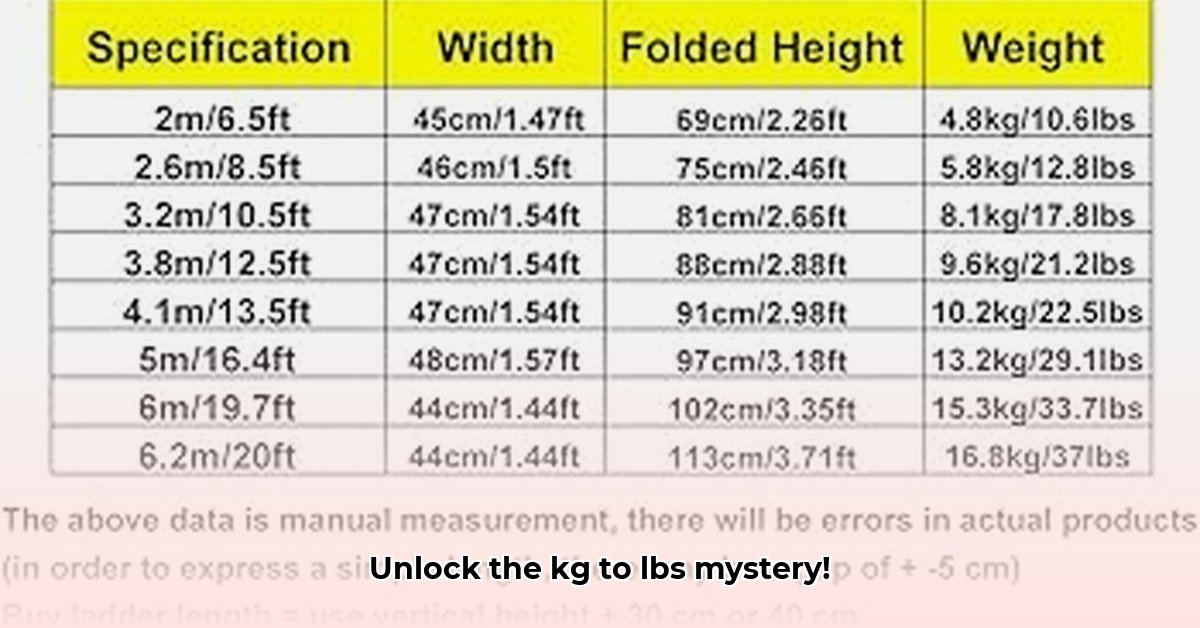
Understanding Kilogram to Pound Conversions
Need to convert 3.35 kilograms (kg) to pounds (lbs)? This guide provides a step-by-step approach to accurate conversions, catering to both everyday needs and scientific precision. The seemingly simple task of converting 3.35 kg to lbs reveals nuances often overlooked. Why is precision important? Because even slight inaccuracies can significantly impact results, particularly in scientific or engineering contexts.
Choosing the correct conversion method depends entirely on the context. For baking a cake, a rough estimate might suffice. But for a scientific experiment, the highest level of accuracy is crucial. This guide addresses both scenarios.
The Importance of Precision
The conversion factor between kilograms and pounds is approximately 2.20462 lbs per kg. However, using a rounded value like 2.2 lbs/kg is suitable for casual conversions, while a more precise factor is vital for scientific applications. Do you need a quick estimate for a recipe or a highly accurate result for a scientific experiment? Context dictates the appropriate level of precision.
Two Methods for Accurate Conversion
We'll outline two methods: a quick estimation method for everyday use and a precise method for applications requiring higher accuracy.
Method 1: Quick Estimation (Rounded Conversion)
This method uses a rounded conversion factor of 2.2 lbs/kg, ideal for situations where an approximate value is sufficient.
- Begin with the weight in kilograms: 3.35 kg
- Multiply by the rounded conversion factor: 3.35 kg * 2.2 lbs/kg = 7.37 lbs (approximately)
This provides a quick and easy estimate, suitable for everyday tasks. However, it lacks the precision needed for scientific applications. Isn't it surprising how easily we can get a usable result so quickly?
Method 2: Precise Calculation
For situations demanding accuracy, use the more precise conversion factor of 2.20462 lbs/kg.
- Start with your weight in kilograms: 3.35 kg
- Multiply by the precise factor: 3.35 kg * 2.20462 lbs/kg = 7.38547 lbs (approximately)
The difference between this result and the rounded method is subtle but significant in applications requiring high precision.
Converting Decimal Pounds to Ounces
Both methods result in a decimal portion of a pound. Since there are 16 ounces in a pound, we can further refine the result. Using the precise calculation (7.38547 lbs):
- Isolate the decimal part: 0.38547 lbs
- Multiply by 16: 0.38547 lbs * 16 oz/lb ≈ 6.17 oz
Therefore, 3.35 kg is approximately 7 pounds and 6 ounces using the precise method. How does this level of detail affect your results?
Choosing the Right Method: Accuracy vs. Speed
The optimal method depends entirely on your needs – a balance between speed and accuracy.
| Method | Conversion Factor | Precision | Ideal Use Cases |
|---|---|---|---|
| Rounded | 2.2 | Low | Cooking, general estimations, casual comparisons |
| Precise | 2.20462 | High | Scientific research, engineering, precise weighing |
Which method will you choose and why? The answer depends on the context and desired level of accuracy.
Scientific Applications: Prioritizing Precision
For scientific applications, using the precise conversion factor (2.20462 lbs/kg) or its inverse (kg/0.45359237 lb) is crucial. Even small errors can accumulate and significantly affect the outcome of experiments or engineering calculations.
Key Considerations for Scientific Conversions:
- Significant Figures: Maintain consistency in significant figures throughout the calculation. Using more digits in the conversion factor doesn't necessarily improve accuracy if the initial weight has limited significant figures.
- Error Propagation: Remember that errors in the initial measurement propagate through calculations. The precision of conversion is only as good as the initial measurement.
This guide provides a clear framework for accurate kilogram to pound conversions, adaptable to various contexts and emphasizing the importance of precision in diverse applications. Choosing the correct method ensures reliable and appropriate results.